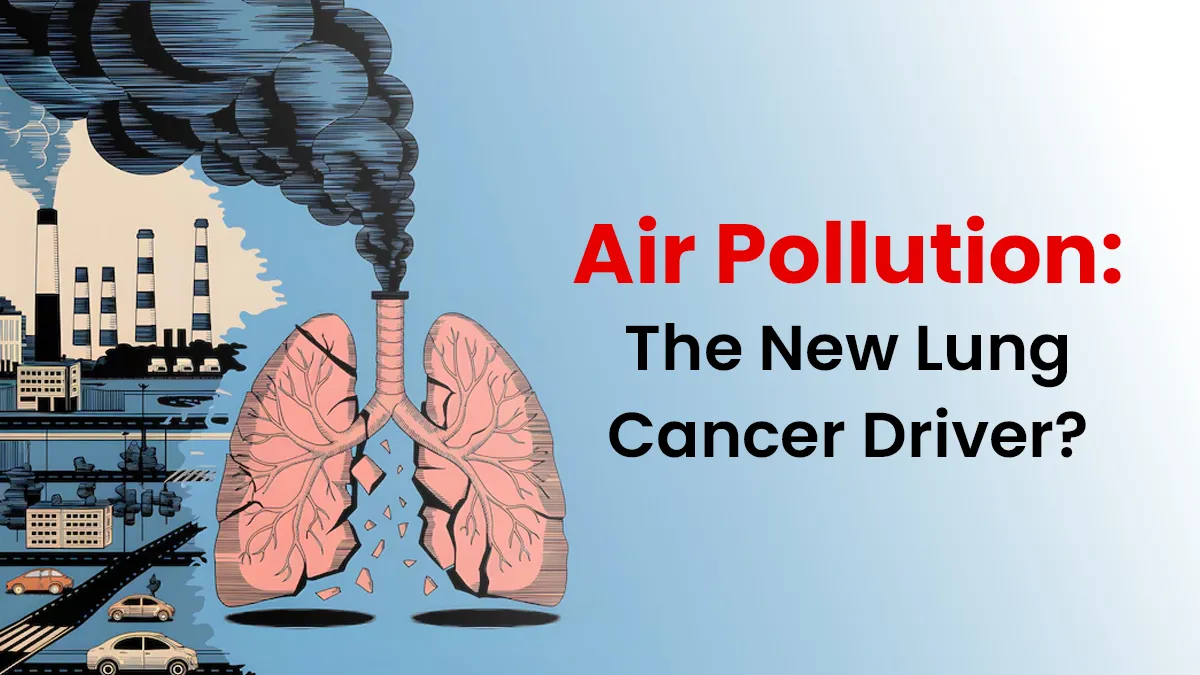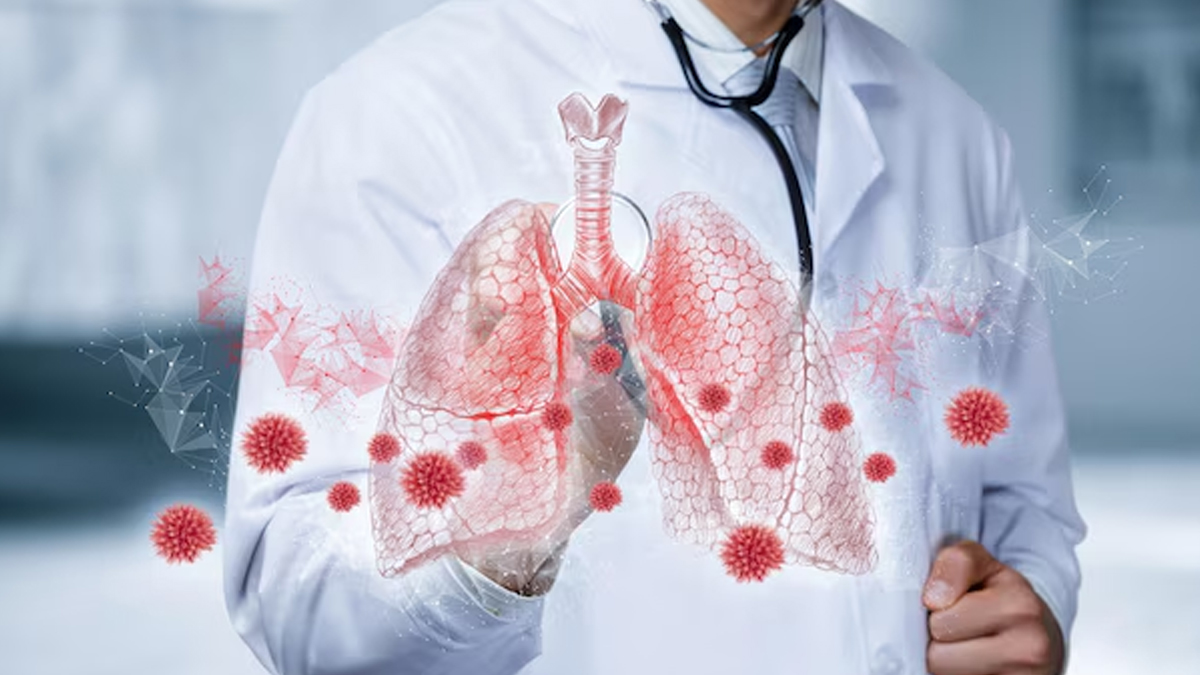
The dangers associated with rising air pollution levels in India have now extended from being a seasonal discomfort to a year-round health threat. Cities such as Delhi, Noida, Gurugram, and Kolkata are now consistently recording an Air Quality Index (AQI) that crosses the hazardous level. This toxic air is now impacting healthy lungs in such a way that even non-smokers are being diagnosed with lung cancer.
Table of Content:-
To understand the extent and severity of toxic AQI's contribution to lung cancer cases in India, the editorial team of Onlymyhealth spoke to Dr Vipul Mishra, Director of Critical Care & Pulmonology at Yatharth Super Speciality Hospital, Noida Extension. Read ahead to read his expert insights.
Air Pollution and Lung Cancer
When we think of the causing factors for lung cancer, most of us consider smoking as the major cause. But did you know that air pollution is also a confirmed and major cause of lung cancer worldwide?
As reported by the American Lung Association, particle pollution in the outdoor air coming from vehicle exhaust, coal-fired power plants, and other industrial sources can cause lung cancer.
Also Read: Wearable Air Purifier Vs Mask: Which One Is More Effective Against Air Pollution?
Dr Vipul Mishra highlighted, “Long-term contact with harmful air pollution, particularly in cities, is highly suspected as a cause of increasing lung cancer in non-smokers, as it causes chronic inflammation and DNA instability in lung tissues.”
Pollutants That Bypass the Body’s Natural Defences
Explaining the microscopic pollution particles that bypass the body’s natural defences and affect the lungs, Dr Mishra said that having an understanding of how the polluted smog bypasses the body’s defences is of utmost importance, as these pollutants have become even more dangerous.
Dr Mishra mentioned, “PM2.5, nitrogen dioxide, benzene, heavy metals such as lead and arsenic, and vehicle exhaust are fine particles that reach deep into the lungs, directly inflaming and damaging lung tissue.
He further added, “Micro-sized particulates bypass nasal filters and airway mucus. They can be found in the alveoli and in the bloodstream, where they induce oxidative stress, inflammation, and the formation of genetic mutations in lung cells.”
Most Vulnerable Groups to Lung Damage from Air Pollution
Talking about the group most vulnerable to pollution-related lung damage and subsequent cancer risk, Dr Mishra stated, “Children, the elderly, people with asthma/COPD, outdoor workers such as labourers, pregnant women, and individuals residing near highways or industrial areas are particularly vulnerable.”
Key Differences Between a General Cough and Early Symptoms of Lung Cancer in a Non-Smoker
General Cough |
Possible Early Sign of Lung Disease |
| Improves within 3 to 5 days | Persists for 2 to 3 weeks or more despite medication |
| Usually linked to the common cold, allergies, or pollution | It can occur even in non-smokers |
Typically mild and self-limiting |
May come with chest pain, weight loss |
| Not usually serious and does not need medical attention easily | Blood in sputum indicates TB, pneumonia, or early lung cancer |
Indoor Air Pollution In Lung Cancer
Discussing how indoor air pollution also has a significant role in the rise of lung cancer cases, Dr Mishra stated that cooking with solid fuels, using incense, poor ventilation, mould, and indoor chemicals dramatically increase the long-term risk of lung cancer, especially in homes with poor air circulation.
Also Read: Amid Delhi’s High AQI, Can N95 Masks Save You from Pollution? We Asked an Expert
How To Reduce Exposure To Toxic Air
- You should keep air purifiers in your home and keep doors and windows shut when the pollution levels are high.
- Growing indoor plants that improve air quality is one of the most effective measures to reduce toxic air exposure.
- One should avoid going outdoors when the AQI level is high.
- One should develop a habit of tracking the AQI of locations to plan safer times for exposure.
- Ensure proper ventilation at home and avoid things that increase indoor pollution, such as chemical-based fumes or excessive smoke during cooking.
- Eat healthy food cooked in less oil and spices.
Dr Mishra also mentioned, “Stay aware of the early signs of lung health issues and seek timely medical intervention and go for regular medical check-ups to monitor lung health and prevent complications.”
Bottomline
Experts now believe that toxic air is one of the leading causes behind the rising cases of lung cancer in non-smokers in India. Previously, it was considered that if you do not consume any intoxicants, such as tobacco, your lungs are safe. However, with increasing micropollutants in the air, this has been proven wrong. Minimising exposure to air pollution and living a healthy lifestyle mitigates the risk of any complications.
Also watch this video
FAQ
Can air pollution cause lung cancer?
Yes, reports suggest that air pollution has become one of the major causes of lung cancer, as toxic air contains polluted particles and chemicals that damage lung cells.What is the no. 1 cause of lung cancer?
Air pollution has become one of the major causes of lung cancer; however, smoking cigarettes is still the single most and number one cause of lung cancer.Can lungs recover from air pollution?
Yes, lungs can recover from short-term air pollution damage due to their self-healing properties and medications. However, prolonged exposure to toxic air might not be recoverable.Do nonsmokers get lung cancer?
Yes, due to high pollutant levels in toxic air, there is a significant rise in lung cancer cases among non-smokers.
How we keep this article up to date:
We work with experts and keep a close eye on the latest in health and wellness. Whenever there is a new research or helpful information, we update our articles with accurate and useful advice.
Current Version
Nov 20, 2025 18:25 IST
Modified By : Sameeksha SharmaNov 20, 2025 18:25 IST
Published By : Sameeksha Sharma